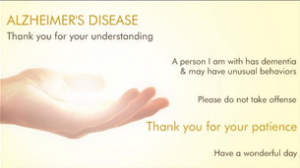by Kim Keller
Sometimes it’s the simplest action that has the biggest impact. That’s why I love these five “good ideas” to help anyone who’s caring for a loved one with dementia. Take a look.
- The Magic of Music — Music, as we’ve come to learn, has a powerful and transformative effect on those with dementia. Check out the movie trailer from this must-see documentary, Alive Inside, and you’ll see what I mean. It’s relatively easy for you to try out — just put together a playlist of your loved one’s favorite music and load the songs onto an iPod shuffle (or any other device with simple controls). To get the biggest benefit, the music should be listened to with earplugs or a headset, in order to minimize potential distractions and allow your loved one to be totally engaged by the music. By the way, Alive Inside is now available for purchase on DVD or iTunes.
- Create a Routine — Have a routine for daily activities like eating, exercising, bathing, sleeping. The discipline of a routine tends to provide calm and focus, and no energy is wasted on superfluous decision-making.
- Calling Cards — One of our contributors, Colleen Lanier, gave us this great suggestion: create calling cards for your loved one. Handing a stranger a card that alerts him or her to your loved one’s impairment can discreetly reduce the potential for awkward and/or misunderstood moments.

- Sundowning Strategies — “Sundowning” is a psychological syndrome that entails increased confusion and restlessness among patients with some form of dementia, particularly Alzheimer’s. The term itself refers to the most common timing of the confusion. Finding simple activities, whether it’s helping with household chores or playing a board game, can help to ease problematic behavior. Dr. Paul Raia, a regular contributor to In Care of Dad, provides some important insight into sundowning here.
- Safe Return — The Alzheimer’s Association has collaborated with MedicAlert to create a nationwide emergency response program called “MedicAlert® + Alzheimer’s Association Safe Return®” which provides a bracelet or pendant for your loved one to wear at all times. The jewelry is inscribed with the words “memory impaired” and an emergency hotline number that operates 24/7, as well as any critical medical information. So if a loved one goes missing, you can call the emergency number and immediately set in motion a search by law enforcement and personnel from the local Alzheimer’s Association. The emergency hotline operators also have full access to all pertinent medical information. The registration is simple and can be done online. The cost, as of this writing, is $55 for the first year, with a $35 renewal fee each year thereafter, plus a $7 shipping fee for the bracelet or pendant. Another consideration is “Comfort Zone,” a GPS tracking service linked to your family’s home computer that monitors your loved one’s whereabouts at all times. The information can also be delivered through text messages. This service is $42.99 per month, with a $45 activation fee. This monthly plan also comes with the MedicAlert + Alzheimer’s Association Safe Return package mentioned above. There may be an additional fee for shipping and handling of the jewelry. Here’s more information from the Alzheimer’s Association.
Kim Keller is the Co-Founder of In Care of Dad. She lives and works in New York City.







Great blog! My mother has dementia and she lives in an assisted care facility near us. ( http://www.prestigecare.com/assisted_services.php ) She stays with us for two months at home during summer. We have tried the music part, and it totally works. She loves it. Having a routine for daily activities is also a good idea to keep them focused.
I’ve seen the transformation that music can make in patients and it’s amazing. Great suggestions. Thanks for sharing.